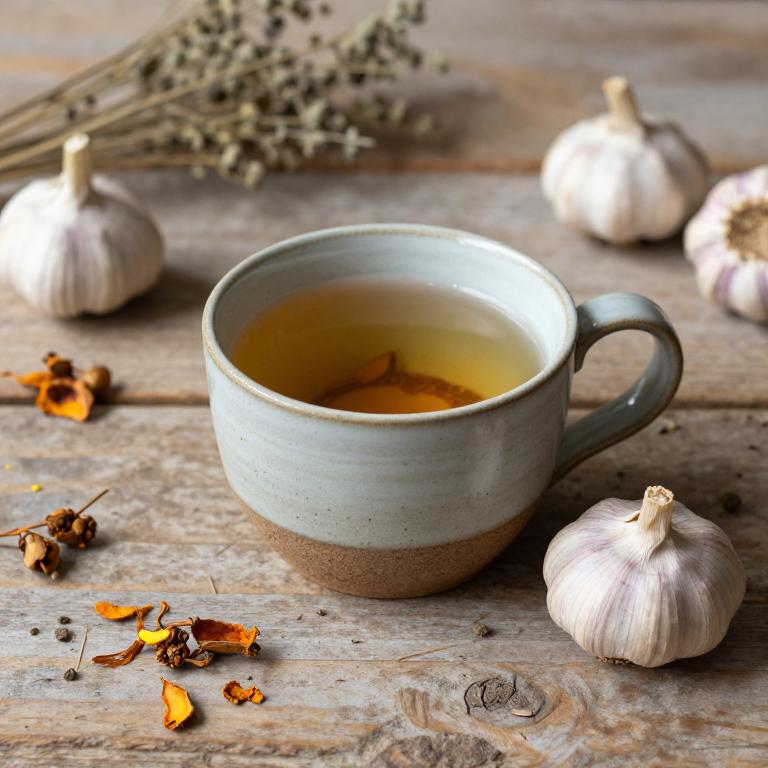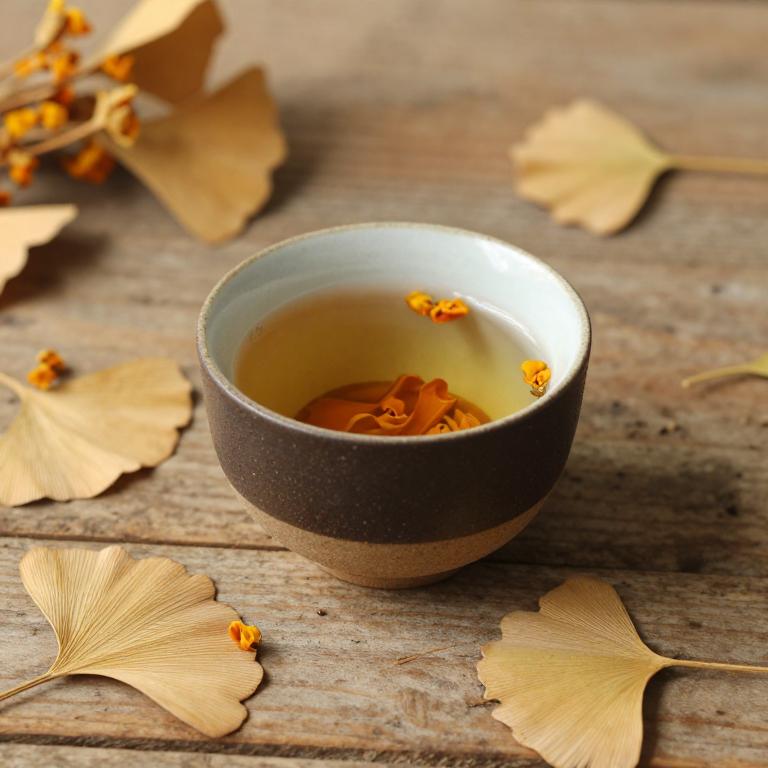10 Best Herbal Teas For Heart Pain

Herbal teas have been traditionally used to support heart health and alleviate symptoms of heart pain, offering a natural alternative to conventional treatments.
Certain herbs such as hawthorn, garlic, and ginger are known for their cardiovascular benefits, helping to improve blood flow and reduce inflammation. These teas may help lower blood pressure and ease chest discomfort, though they should not replace medical advice or treatment for serious heart conditions. It is important to consult a healthcare provider before using herbal teas, especially for individuals with existing heart issues or those taking medications.
When prepared properly, herbal teas can be a soothing and potentially beneficial addition to a heart-healthy lifestyle.
Table of Contents
- 1. Stinging nettle (Urtica dioica)
- 2. Thistle (Silybum marianum)
- 3. St. john's wort (Hypericum perforatum)
- 4. Red sage (Salvia miltiorrhiza)
- 5. Garlic (Allium sativum)
- 6. Ginkgo (Ginkgo biloba)
- 7. Common grape (Vitis vinifera)
- 8. Ginger (Zingiber officinale)
- 9. Turmeric (Curcuma longa)
- 10. Chamomile (Matricaria chamomilla)
1. Stinging nettle (Urtica dioica)

Urtica dioica, commonly known as stinging nettle, has been traditionally used in herbal medicine for its potential cardiovascular benefits.
While there is limited scientific evidence directly linking stinging nettle to the treatment of heart pain, some studies suggest that it may help reduce inflammation and lower blood pressure, which are risk factors for heart-related issues. Herbal teas made from dried stinging nettle leaves are often consumed for their diuretic and detoxifying properties, which may indirectly support heart health. However, it is important to consult with a healthcare professional before using stinging nettle tea, especially for individuals with existing heart conditions or those taking medications.
As with any herbal remedy, the effectiveness and safety of urtica dioica for heart pain can vary, and more research is needed to fully understand its role in cardiovascular care.
2. Thistle (Silybum marianum)

Silybum marianum, commonly known as milk thistle, is a herbal remedy that has been traditionally used for its potential benefits on heart health.
Herbal teas made from silybum marianum are believed to support cardiovascular function by promoting the health of liver cells, which in turn may aid in detoxification and overall metabolic balance. While scientific research on its direct effects on heart pain is limited, some studies suggest that the active compound silymarin may have antioxidant and anti-inflammatory properties that could indirectly benefit heart health. These teas are often consumed as a natural supplement to support heart function, though they should not replace prescribed medical treatments for heart conditions.
It is important to consult with a healthcare provider before using silybum marianum, especially for individuals with existing heart issues or those taking medications.
3. St. john's wort (Hypericum perforatum)

Hypericum perforatum, commonly known as St. John's wort, is traditionally used in herbal teas to support cardiovascular health and alleviate heart-related discomfort.
While it is more widely recognized for its antidepressant properties, some studies suggest that its anti-inflammatory and antioxidant compounds may help reduce inflammation and oxidative stress in the cardiovascular system. When consumed as a tea, hypericum perforatum may promote better blood flow and support overall heart function, though it should not replace conventional medical treatments for serious heart conditions. It is important to consult with a healthcare professional before using St. John's wort, especially if you are on medications, as it can interact with certain drugs.
Despite its potential benefits, more research is needed to fully understand its efficacy and safety in treating heart pain.
4. Red sage (Salvia miltiorrhiza)

Salvia miltiorrhiza, also known as Danshen, is a traditional Chinese herb commonly used in herbal teas to support cardiovascular health.
It is believed to improve blood circulation and reduce inflammation, which may help alleviate symptoms of heart pain. The active compounds in Salvia miltiorrhiza, such as tanshinones and salvianolic acids, are thought to have antioxidant and anti-platelet properties that benefit the heart. While some studies suggest it may help in managing angina and other heart-related conditions, it is important to consult a healthcare professional before using it for heart pain.
As with any herbal remedy, the effectiveness and safety of Salvia miltiorrhiza can vary, and it should not replace conventional medical treatments.
5. Garlic (Allium sativum)

Allium sativum, commonly known as garlic, has been traditionally used in herbal medicine for its potential cardiovascular benefits.
When brewed into a tea, garlic may help support heart health by promoting healthy blood pressure levels and improving circulation. The active compounds in garlic, such as allicin, are believed to have antioxidant and anti-inflammatory properties that may reduce the risk of heart disease. However, it is important to note that while some studies suggest garlic may offer modest benefits for heart-related conditions, it should not replace prescribed medical treatments for heart pain.
Individuals experiencing persistent heart pain should consult a healthcare professional before using garlic tea or any herbal remedy as a therapeutic option.
6. Ginkgo (Ginkgo biloba)

Ginkgo biloba herbal tea is often used as a natural remedy to support cardiovascular health and may help alleviate symptoms of heart pain.
This tea is derived from the leaves of the ginkgo tree, which is known for its rich content of antioxidants and flavonoids that can improve blood circulation. Some studies suggest that ginkgo biloba may enhance blood flow and reduce inflammation, which could be beneficial for individuals experiencing heart-related discomfort. However, it is important to consult with a healthcare provider before using ginkgo biloba, especially for those with existing heart conditions or taking medications.
While it may offer some supportive benefits, it should not replace conventional medical treatments for heart pain.
7. Common grape (Vitis vinifera)

Vitis vinifera, commonly known as the grapevine, has been traditionally used in herbal medicine for its potential cardiovascular benefits.
Herbal teas made from Vitis vinifera, particularly its leaves and seeds, are believed to support heart health by improving circulation and reducing oxidative stress. These teas may contain compounds like resveratrol, which has been studied for its anti-inflammatory and cardioprotective properties. While some anecdotal evidence suggests they may alleviate symptoms of heart pain, more scientific research is needed to confirm their efficacy.
As with any herbal remedy, it is advisable to consult a healthcare professional before using Vitis vinifera tea for heart-related issues.
8. Ginger (Zingiber officinale)

Zingiber officinale, commonly known as ginger, has been traditionally used in herbal teas to support cardiovascular health and alleviate symptoms of heart pain.
The active compounds in ginger, such as gingerols and shogaols, possess anti-inflammatory and antioxidant properties that may help reduce arterial inflammation and improve blood flow. Regular consumption of ginger tea is believed to support healthy cholesterol levels and reduce the risk of blood clot formation, both of which are important for heart health. However, while some studies suggest potential benefits, it is important to consult a healthcare professional before using ginger tea as a treatment for heart-related conditions.
Ginger herbal tea can be a complementary therapy, but it should not replace prescribed medical treatments for heart pain.
9. Turmeric (Curcuma longa)

Curcuma longa, commonly known as turmeric, has been traditionally used in herbal teas to support cardiovascular health and alleviate heart-related discomfort.
The active compound in turmeric, curcumin, possesses potent anti-inflammatory and antioxidant properties that may help reduce inflammation in the arteries and improve blood flow. When brewed into a herbal tea, curcuma longa can provide a soothing and mild remedy for individuals experiencing mild heart pain or chest discomfort. However, it is important to consult a healthcare professional before using turmeric tea as a treatment for heart conditions, as it may interact with certain medications.
While turmeric tea may offer some supportive benefits, it should not replace conventional medical treatments for serious heart issues.
10. Chamomile (Matricaria chamomilla)

Matricaria chamomilla, commonly known as chamomile, is a popular herbal tea often used for its calming and soothing properties.
While it is widely recognized for its ability to aid with sleep and digestion, some studies suggest that chamomile may also have potential benefits for heart health. The tea contains compounds such as apigenin, which may help reduce inflammation and oxidative stress, both of which are linked to cardiovascular issues. However, it is important to note that chamomile should not be considered a substitute for medical treatment of heart pain, and individuals with heart conditions should consult a healthcare professional before using it.
Despite its possible supportive role, more research is needed to fully understand its effectiveness in alleviating heart-related discomfort.